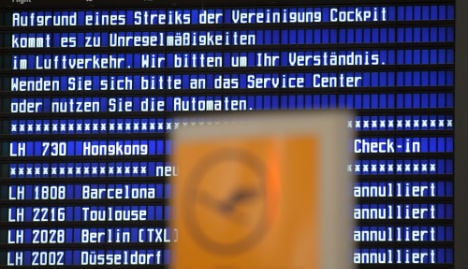STRIKES
Lufthansa offers pilots new wage deal to end strike
Germany's flagship carrier Lufthansa on Friday offered pilots a new wage deal to end a crippling three-day strike that has led to mass flight cancellations affecting over 300,000 passengers.
Published: 26 November 2016 07:20 CET

Lufthansa is losing €10m a day due to cancelled flights. Photo: Stefan Puchner/dpa
However the pilots' union Cockpit swiftly rejected the new offer. The airline said it had been forced to cancel more than 2,700 flights since the start of the walkout, which was called by the pilots' union and is set to last through Saturday. It is the pilots' 14th strike since April 2014.
To resolve the long-running dispute, Lufthansa said it could offer a 2.4-percent pay rise in 2016, going up by another two percent to reach 4.4 percent in 2017.
Pilots would also receive a one-off payment equivalent to nearly two months' wages. As part of the deal, Lufthansa also offered to hire up to 1,000 new junior pilots. The airline had previously proposed a 2.5-percent wage hike.
The improved deal was made possible through “savings in other areas” such as retirement provisions, said Bettina Volkens, Lufthansa's human resources chief.
Late Friday Cockpit rejected the new offer, dismissing it as an attempt to “sell old wine under a new label”, Joerg Handwerg, a member of the union management, told AFP. He added that the strike would not continue after Saturday but that new action could be taken later.
The union has been demanding a pay rise of an average of 3.66 percent per year, retroactive for the past five years. Top-selling daily Bild says the strike is costing Lufthansa around 10 million euros ($10.5 million) each day.
Lufthansa had to cancel 830 domestic and European flights on Friday alone, with another 137 long-haul flights to be scrapped on Saturday. Affected passengers can rebook their flights without charge or request rail travel vouchers, the airline said.
Austrian Airlines and Swiss — part of the Lufthansa group — have tried to pick up some of the slack by expanding their services to Germany. The group's other airlines — including Germanwings, Air Dolomiti and
Brussels Airlines — have not been affected by the strike.
Lufthansa's hub management board member Harry Hohmeister said on Thursday it was “not possible” to meet the pilots' demands in full and noted that they were already better paid than their competitors.
A Lufthansa pilot in the top seniority category can earn more than 22,000 euros ($23,000) per month.
The German carrier has been battling a series of walkouts by both the pilots and cabin crew over the past two years, as it seeks to bring down costs to survive competition from budget rivals such as EasyJet and Ryanair.
In July, it ended a long-running dispute with cabin crew through a deal on pay and working conditions, including a no-strike agreement and job guarantees until 2021.
The breakthrough came after cabin staff staged the longest walkout in Lufthansa's history last November, with a seven-day stoppage that led to 4,700 flight cancellations and grounded over half a million passengers.
The airline said last month that it expects its annual earnings before interest and tax will reach “approximately the previous year's level” of 1.8 billion euros.
Url copied to clipboard!


 Please whitelist us to continue reading.
Please whitelist us to continue reading.